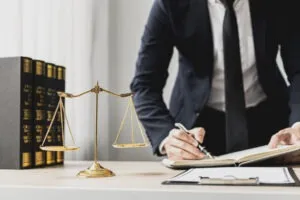
Next, the discovery phase begins, where both parties exchange information and evidence. This process allows each side to build their case and prepare for trial. Finally, the trial takes place, where lawyers present the evidence, make their arguments, and the court reaches a verdict.
If you’re interested in understanding the process of a securities fraud lawsuit, you can contact a securities fraud lawyer from our team at Viles & Beckman. Call or fill out our online contact form to learn more.
Securities Fraud Claims Begin with an Investigation
When you suspect securities fraud, the first step is to contact a lawyer who can gather evidence. Attorneys must carefully review financial documents, such as company reports and shareholder statements, to identify discrepancies or irregularities.
Additionally, a law firm may need to interview witnesses or experts who can provide valuable insights. Lawyers help with all aspects of your claim and will review the evidence and assess the strength of your case for this white-collar crime.
If they believe you have a valid claim, they will help you file a complaint with the appropriate regulatory agency or court. The initial investigation is crucial in determining the viability of your securities fraud lawsuit.


Expect More, Receive More: Legal Support That Feels Like Family
You Can File a Securities Fraud Complaint
To begin your securities fraud lawsuit, you’ll need to file a complaint outlining the details of the alleged misconduct. This complaint serves as the formal initiation of the legal process.
When drafting the complaint, it’s essential to provide a clear and concise account of the fraudulent activity, including:
- The parties involved
- The specific acts of misconduct
- Any evidence or supporting documentation you may have
The complaint should also state the legal claims you assert, such as violations of securities laws or breach of fiduciary duty. Once a lawyer prepares your complaint, it must be filed with the appropriate court and served on the defendants.
This step officially launches the legal proceedings and sets the stage for the subsequent phases of the securities fraud lawsuit.
Your Securities Fraud Lawsuit Will Involve Discovery
When you’re ready to gather evidence and uncover the truth about the alleged misconduct, it’s time to dive into the discovery phase of your case. During this phase, both parties exchange information and evidence relevant to the lawsuit.
Your lawyer and the defense attorney will request and respond to written questions, known as interrogatories, which aim to elicit essential facts and details about the case.
Additionally, you may be required to provide documents and records that support your claims or defenses. Your attorney can assess the credibility of any witnesses for your claim during the discovery process.
Dispositions and Securities Fraud Lawsuits
Depositions, which are sworn statements given under oath, may also be conducted during this phase. These depositions allow each party’s attorney to question witnesses, including the opposing party, to gather further evidence and assess their credibility.
The discovery phase is crucial for building a solid case and preparing for trial.
Securities Fraud Lawsuits May Go to Trial
Sometimes, lawyers resolve securities fraud cases outside of trial through a period of negotiations with the at-fault party. Settling out of court may allow you to secure funds to cover your losses while avoiding court fees.
However, your lawyer may take your case to court if the other party refuses to agree to a settlement. Both parties present their evidence and arguments during the trial, and the judge or jury will ultimately determine the case’s outcome.
What Happens During a Securities Fraud Trial?
The plaintiff – or the party bringing the lawsuit – will present their case first. They will:
- Call witnesses
- Introduce documents
- Present any other evidence they have to support their claims of securities fraud
The defendant, on the other hand, will have the opportunity to cross-examine the plaintiff’s witnesses and present their own evidence to challenge the allegations.
After both sides have presented their cases, the judge or jury will deliberate and reach a verdict.
If the plaintiff is successful, the court may award them damages or other forms of relief. However, if the defendant is found not liable, the court may dismiss the case, and the plaintiff will not receive any compensation.
Speak to Us to Learn More About a Securities Fraud Lawsuit
What is the process of a securities fraud lawsuit? These claims involve an initial investigation, the filing of a complaint, legal discovery, and potentially a trial. Some cases end up resolved before they go to court.
With this knowledge, you can understand and navigate the process of a securities fraud lawsuit. You can get additional details from our team at Viles & Beckman when you call or complete our online contact form.



